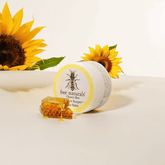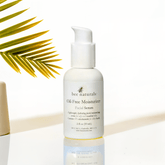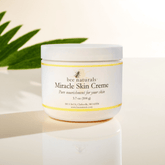The Truth About Parabens Part 2: Parabens Versus Alternatives, How Do They Compare?
In recent years, due to outstanding concerns about the safety of parabens, many companies have turned to alternative preservatives for use in their personal care products. These alternatives have been chosen for their ability to achieve two primary goals – inhibit the growth of bacteria and fungi in care products, and maintain their safety for use by consumers. Some prevalent alternatives include the following;
Phenoxyethanol

This ingredient is one of the most popular alternatives to parabens. It is considered a safer alternative and has been approved by regulatory bodies in Europe and the United States for personal care products. Phenoxyethanol works by disrupting the cell membranes of microorganisms, leading to their death.
Benzyl Alcohol

Benzyl alcohol is another prevalent alternative to parabens. It is a natural ingredient extracted from fruits and flowers, which makes it a more desirable option for those seeking natural alternatives to synthetic preservatives. Experts consider it a broad-spectrum preservative, meaning it can inhibit the growth of several bacteria and fungi. It is also considered a low-risk ingredient and has been approved by several regulatory bodies.
Potassium Sorbate and Sodium Benzoate


These ingredients feature similar characteristics, which makes them ideal alternatives for parabens. They inhibit microorganism growth by altering their cellular pH balance. They are commonly used in food preservation and are also effective preservatives in personal care products. That said, they may not be as effective as parabens against certain types of bacteria and fungi.
While these parabens alternatives are considered safe for personal care products, they may not be as effective as parabens against all types of microorganisms. Additionally, some of these alternatives may be more expensive or difficult to work with, impacting the cost and formulation of personal care products. Ultimately, the choice of preservative used in personal care products will depend on various factors, including price, efficacy, and customer demand for natural or synthetic ingredients.
What We Use At Bee Naturals
At Bee Naturals, we provide pure, practical, high-performance skincare products by also including a blend of alternative preservatives. Aside from some mentioned earlier, we typically use a combination of Caprylyl glycol and Ethylhexylglycerin as preservatives.
Caprylyl Glycol is a multi-functional ingredient derived from coconut oil. It has been shown to have antimicrobial and moisturizing properties, making it a popular choice in skincare products. Furthermore, it enhances the effectiveness of other preservatives, which is why it is often used in combination with other preservatives.
Ethylhexylglycerin, on the other hand, is a synthetic compound often used as a preservative in skincare and cosmetic products. It disrupts the cellular membranes of microorganisms, preventing their growth and proliferation. Like Caprylyl Glycol, EHG also has moisturizing properties and can help improve a product’s overall texture and feel.
Together, these two preservatives work synergistically to effectively prevent bacteria and fungi growth in skincare products while providing moisturizing benefits synonymous with Bee Naturals products. Our decision to use these ingredients as paraben alternatives demonstrate our commitment to providing our customers with safe, and effective, skincare products.
Benefits of Using Caprylyl Glycol EHG Compared To Other Preservatives

Using this mixture as preservatives in skincare products offer several advantages over other options that are more commonly used on the market.
First, this mixture is considered a safer and more effective alternative capable of reducing the risks of endocrine disruption. By using a blend of alternative preservatives, like Caprylyl Glycol EHG, Bee Naturals can offer customers natural products free from potentially harmful chemicals.
Caprylyl Glycol EHG also acts as a moisturizing agent, which can help to hydrate and soothe the skin, compared to other popular alternatives in the market. This characteristic is especially beneficial for individuals with dry or sensitive skin who may be prone to irritation from other preservatives.
In addition, these ingredients also work together to provide a broad-spectrum antimicrobial effect, which helps to ensure that products remain safe for use over an extended period. They are also highly stable and compatible with several skincare ingredients. This means skincare companies can use them in formulations with minimal risk of destabilization or adverse reactions.
Caprylyl Glycol EHG vs. Parabens
Caprylyl glycol and Ethylhexylglycerin have emerged as popular alternatives to parabens in skincare products due to their effectiveness at preventing microbial growth. But how does the Caprylyl Glycol EHG mixture compare to parabens?
One of the key differences between Caprylyl Glycol EHG and parabens is their safety profile. Parabens have been linked to potential health risks, including endocrine disruption and reproductive toxicity. In contrast, Caprylyl Glycol EHG has received Generally Recognized As Safe (GRAS) status from the United States Food and Drug Administration (FDA) and has been extensively tested for safety.
Caprylyl Glycol EHG also exhibits more versatility than parabens. They are compatible with a broader range of skincare ingredients and are less likely to cause adverse reactions, making them suitable for individuals with sensitive skin. Their hydrating and soothing properties also make Caprylyl Glycol EHG an ideal option for improving skin texture and appearance.
At Bee Naturals, we are committed to using only the highest quality natural ingredients in our formulations, avoiding potentially harmful chemicals like parabens, sulfates, and phthalates. As such, we incorporate Caprylyl Glycol EHG in several of our formulations. Take advantage of our safe and effective formulations and explore healthier skin.







Leave a comment
Please note, comments need to be approved before they are published.